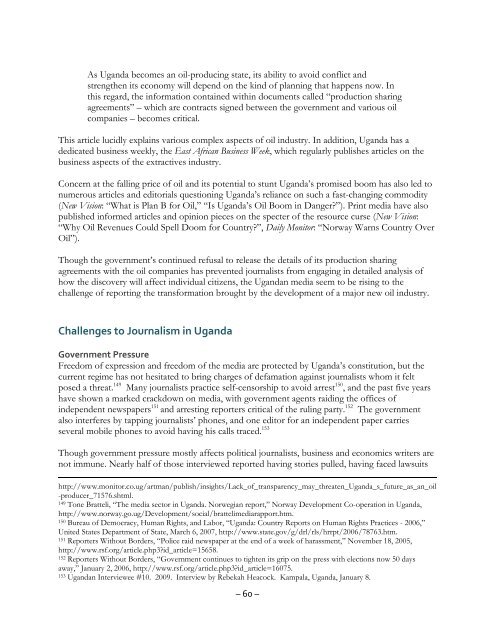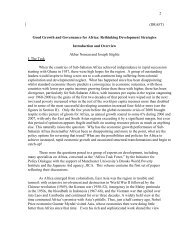THERE WILL BE INK - Initiative for Policy Dialogue
THERE WILL BE INK - Initiative for Policy Dialogue
THERE WILL BE INK - Initiative for Policy Dialogue
Create successful ePaper yourself
Turn your PDF publications into a flip-book with our unique Google optimized e-Paper software.
As Uganda becomes an oil-producing state, its ability to avoid conflict andstrengthen its economy will depend on the kind of planning that happens now. Inthis regard, the in<strong>for</strong>mation contained within documents called “production sharingagreements” – which are contracts signed between the government and various oilcompanies – becomes critical.This article lucidly explains various complex aspects of oil industry. In addition, Uganda has adedicated business weekly, the East African Business Week, which regularly publishes articles on thebusiness aspects of the extractives industry.Concern at the falling price of oil and its potential to stunt Uganda’s promised boom has also led tonumerous articles and editorials questioning Uganda’s reliance on such a fast-changing commodity(New Vision: “What is Plan B <strong>for</strong> Oil,” “Is Uganda’s Oil Boom in Danger?”). Print media have alsopublished in<strong>for</strong>med articles and opinion pieces on the specter of the resource curse (New Vision:“Why Oil Revenues Could Spell Doom <strong>for</strong> Country?”, Daily Monitor: “Norway Warns Country OverOil”).Though the government’s continued refusal to release the details of its production sharingagreements with the oil companies has prevented journalists from engaging in detailed analysis ofhow the discovery will affect individual citizens, the Ugandan media seem to be rising to thechallenge of reporting the trans<strong>for</strong>mation brought by the development of a major new oil industry.Challenges to Journalism in UgandaGovernment PressureFreedom of expression and freedom of the media are protected by Uganda’s constitution, but thecurrent regime has not hesitated to bring charges of defamation against journalists whom it feltposed a threat. 149 Many journalists practice self-censorship to avoid arrest 150 , and the past five yearshave shown a marked crackdown on media, with government agents raiding the offices ofindependent newspapers 151 and arresting reporters critical of the ruling party. 152 The governmentalso interferes by tapping journalists’ phones, and one editor <strong>for</strong> an independent paper carriesseveral mobile phones to avoid having his calls traced. 153Though government pressure mostly affects political journalists, business and economics writers arenot immune. Nearly half of those interviewed reported having stories pulled, having faced lawsuitshttp://www.monitor.co.ug/artman/publish/insights/Lack_of_transparency_may_threaten_Uganda_s_future_as_an_oil-producer_71576.shtml.149 Tone Bratteli, “The media sector in Uganda. Norwegian report,” Norway Development Co-operation in Uganda,http://www.norway.go.ug/Development/social/brattelimediarapport.htm.150 Bureau of Democracy, Human Rights, and Labor, “Uganda: Country Reports on Human Rights Practices - 2006,”United States Department of State, March 6, 2007, http://www.state.gov/g/drl/rls/hrrpt/2006/78763.htm.151 Reporters Without Borders, “Police raid newspaper at the end of a week of harassment,” November 18, 2005,http://www.rsf.org/article.php3?id_article=15658.152 Reporters Without Borders, “Government continues to tighten its grip on the press with elections now 50 daysaway,” January 2, 2006, http://www.rsf.org/article.php3?id_article=16075.153 Ugandan Interviewee #10. 2009. Interview by Rebekah Heacock. Kampala, Uganda, January 8.– 60 –














